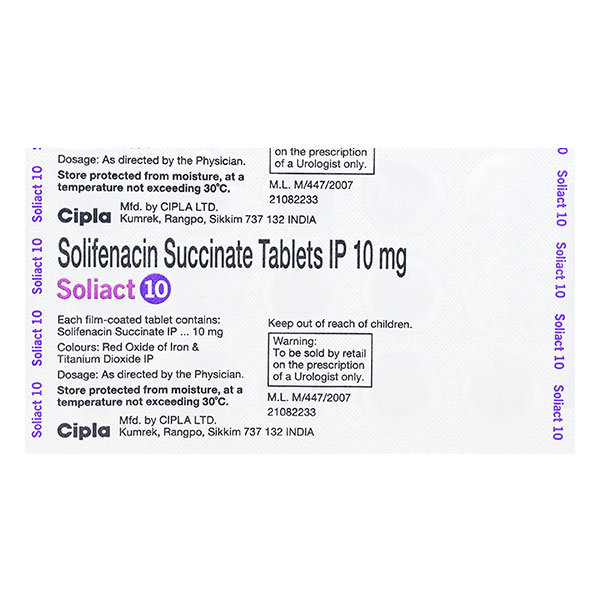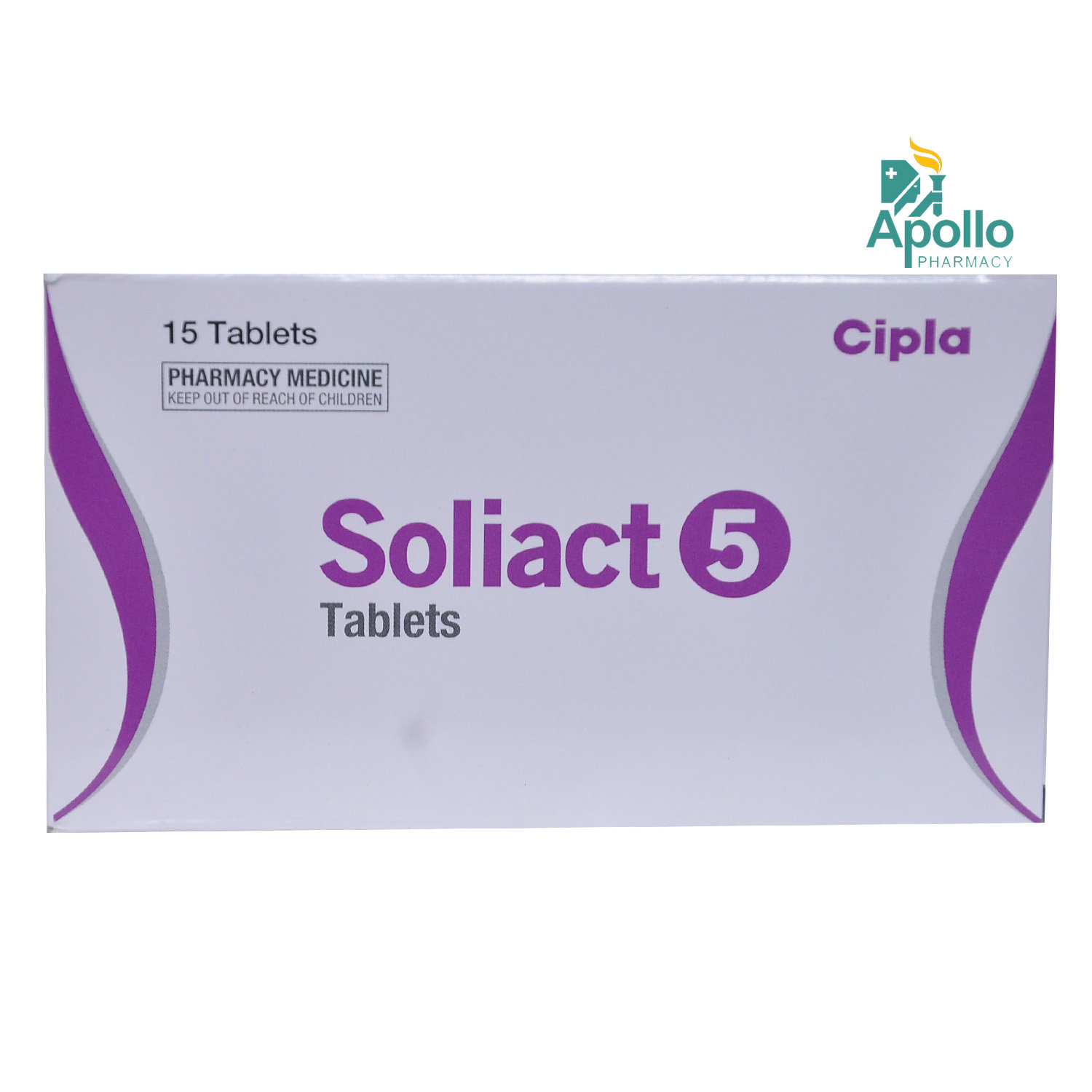Solifenacin
About Solifenacin
Solifenacin belongs to the group of medications called ‘urinary antagonists' or 'antispasmodics' primarily used in the treatment of overactive bladder (OAB) symptoms.
Solifenacin contains ‘Solifenacin’ that relaxes the urinary bladder muscles, which in turn decreases the activity of the overactive bladder. Solifenacin stops sudden contractions of urinary bladder muscles, thereby enabling control over urination. Thus, it increases the amount and volume of urination that can be held by your bladder.
Take Solifenacin as prescribed by the doctor. Common side effects of Solifenacin are dry mouth, blurred vision, constipation, nausea, dyspepsia (indigestion), abdominal pain, burping or belching, heartburn, and stomach upset. Inform your doctor if these side effects do not go away or get worse.
Do not take Solifenacin if you are allergic to ‘solifenacin’ or any other ingredients present in it. Inform your doctor if you are pregnant or breastfeeding. If you have an intolerance to sugars, tell your doctor as this medicine contains lactose. Do not take grapefruit or grapefruit juice with this medication. Avoid driving or operating heavy machinery, as this medicine may cause blurred vision or drowsiness.
Uses of Solifenacin
Medicinal Benefits
- Helps relieve symptoms of overactive bladder such as frequent urination, urgency, and urinary incontinence.
- Reduces sudden urges to urinate by relaxing the bladder muscles.
- Increases bladder capacity, allowing better urine control.
- Improves quality of life by reducing bathroom visits and nighttime urination.
- Helps manage urinary leakage and discomfort due to bladder overactivity.
- Enhances confidence and comfort in daily activities by improving bladder control.
Directions for Use
- Solifenacin can be taken with or without food.
- It is recommended to take Solifenacin once daily at the same time each day or as advised by your doctor.
- Swallow Solifenacin as a whole with a glass of water.
- Do not crush, chew, or break it.
Storage
Side Effects of Solifenacin
- Dry mouth
- Blurred vision
- Constipation
- Nausea
- Dyspepsia (indigestion)
- Urinary tract infections
- Blurred vision
- Abdominal pain
- Burping or belching
- Heartburn
- Stomach upset
Drug Warnings
- Do not take Solifenacin if you are allergic to ‘solifenacin’ or any contents of it.
- Before taking Solifenacin, inform your doctor if you are pregnant or breastfeeding or if you have kidney disease, liver disease, bladder blockage, controlled narrow-angle glaucoma, or stomach or bowel problems (including constipation), or a history of heart rhythm problems (including QT prolongation).
- Solifenacin has lactose, so inform your doctor if you have an intolerance to any sugars.
- Solifenacin may cause dizziness or blurred vision. So, do not drive or operate any heavy machinery if you are not alert after taking Solifenacin.
- It can increase body temperature by decreasing sweating. So, avoid hot weather or doing strenuous exercise as this may cause overheating leading to unwanted effects.
Drug Interactions
Drug-Drug interactions: Solifenacin may interact with other anticholinergic medicines, cholinergic drugs, gastrointestinal agents (metoclopramide and cisapride), antifungal drugs (ketoconazole and itraconazole), drugs used to treat HIV (ritonavir and nelfinavir), antihypertensives (verapamil and diltiazem), antibiotics (rifampicin), antiepileptic drugs (phenytoin and carbamazepine), and bisphosphonates.
Drug-Food interactions: Do not take grapefruit or grapefruit juice while using Solifenacin.
Drug-Disease interactions: Solifenacin should be used with caution in patients with urinary retention (inability to urinate), severe stomach or bowel conditions, myasthenia gravis (a muscle disease), glaucoma (eye problem), kidney dialysis, severe liver disease, and severe kidney disease.
Drug-Drug Interactions Checker List:
Safety Advice

Alcohol
unsafeAvoid taking alcohol as it increases the risk of side effects.

Pregnancy
consult your doctorSolifenacin is a category C medicine. It should be used in pregnant women if the benefits outweigh the risks.

Breast Feeding
cautionIf you are a breastfeeding mother, please inform your doctor before taking Solifenacin. Your doctor will decide if you will take Solifenacin or continue breastfeeding, but you should not do both.

Driving
cautionSolifenacin may sometimes cause blurred vision, drowsiness or dizziness. So, avoid driving or operating heavy machinery if you suffer from these effects after taking Solifenacin.

Liver
cautionSolifenacin should be used with caution in patients with liver diseases. Dose adjustments may be necessary.

Kidney
cautionSolifenacin should be used with caution in patients with kidney diseases. Dose adjustments may be necessary.

Children
unsafeSolifenacin should not be used in children and adolescents below 18 years of age.
Habit Forming
Diet & Lifestyle Advise
- Eat fresh fruits like pears, bananas, citrus fruits, and green vegetables like beans and potatoes.
- Try to take cranberry juice as it helps in minimising urinary infections.
- Avoid coffee, tea, and carbonated drinks, which contain caffeine.
- Do not consume processed, fried, or spicy foods, as these foods can irritate your bladder.
- Limit alcohol intake as it can increase the risk of side effects.
- Quit smoking and exercise regularly.
Special Advise
- Excessive intake of Solifenacin can make you sweat less, thereby increasing the risk of heat stroke in summer. So avoid doing tasks which may cause to overheat.
- Intake of Solifenacin may occasionally cause blurry vision and dizziness, so avoid driving a motor vehicle, operating heavy machinery, and performing hazardous tasks that require mental alertness.
Patients Concern
Disease/Condition Glossary
Overactive bladder (OAB): In normal conditions, when the urinary bladder is filled with urine, it sends a message to the brain that an individual is ready to urinate. During the urination process, bladder muscles contract, which ultimately leads to a uniform flow of urine. Contrary to this, in an Overactive bladder (OAB), the urinary bladder muscles start contracting before the urine is filled in the urinary bladder, thereby causing frequent urges to urinate. Solifenacin prevents these sudden bladder muscle contractions and increases the volume and amount of urine that the bladder can hold. Thus, Solifenacin helps to control the release of urine and helps reduce symptoms of OAB like a strong urge to urinate, frequent urination and reduced urine flow.
FAQs
Solifenacin is primarily used in the treatment of overactive bladder (OAB) symptoms.
Solifenacin is used to treat an overactive bladder in which an individual is unable to control urination and always have a strong urge to urinate. Solifenacin prevents these sudden bladder muscle contractions and increasing the volume and amount of urine that the bladder can hold. Thus, Solifenacin helps to control the release of urine and helps reduce symptoms of OAB like a strong urge to urinate, frequent urination and reduced urine flow.
Solifenacin may cause blurred vision in some cases. Consult your doctor immediately if this condition persists or worsens while using this medicine.
Ketoconazole is an antifungal medicine and it may interact with Solifenacin. So, inform your doctor about all the prescription and non-prescription medicines before taking Solifenacin to avoid unwanted effects.
Dry mouth, constipation, urinary tract infection and blurred vision are some of the common side effects of Solifenacin.
If you have bladder problems, stomach problems, narrow-angle glaucoma, liver/kidney problems and irregular heartbeat, please contact a doctor before taking Solifenacin.
Dry mouth is the most common side effects of Solifenacin, so you can drink plenty of fluids or water, suck hard candy or ice chips, chew (sugarless) gum, or use a saliva substitute. However, if you are a kidney patient before taking any fluid or electrolytes, it is better to consult a doctor.
If you are taking antidiabetic medicines (pramlintide), potassium tablets and antifungals (like itraconazole, ketoconazole), among others, let your doctor know about these drugs before using Solifenacin. These medicines may affect the working of Solifenacin and slow its excretion from the body.
Overactive bladder is a condition in which the urinary bladder muscles constrict uncontrollably, thereby causing an urgent need to urinate, frequent urination, and inability to control urination.
Solifenacin starts to work within 3 to 8 hours, but it can take up to 4 to 6 weeks to work fully.
Take Solifenacin at around the same time(s) every day. Follow the directions on your prescription label or as directed by the physician.
Solifenacin is a safe and effective medication if prescribed by a doctor. However, it is not suitable for everyone, especially those with specific underlying conditions. Please discuss with your doctor whether it is appropriate.
A marked increased risk of dementia was associated with the use of Solifenacin. Please seek medical attention if you have experienced any symptoms or if they persist.
Solifenacin does not affect any type of contraception.
This medication is normally taken on a long-term basis to help regulate your symptoms. Your doctor will check in every 6 to 12 months to evaluate if you should continue taking it.
If you have urinary incontinence, it can help to cut down on alcohol and drinks containing caffeine, such as coffee, tea, cola and energy drinks.
Solifenacin should not make you lose or gain weight. However, very rarely Solifenacin can make you feel less hungry, so you may lose weight.
Do not take solifenacin for longer than is necessary. Every 6 to 12 months, your doctor will determine whether your treatment is still required. In older adults taking solifenacin, there may be an increased chance of confusion and dementia worsening. If you're concerned, talk to your doctor.
Talk to your doctor if you're thinking about stopping your medicine. Do not stop taking solifenacin without talking to your doctor first. If you've been taking it for at least six months, your doctor may suggest that you stop for up to 4 weeks to see how your symptoms change without it. Some people find that their symptoms are still better after they've stopped taking it.






